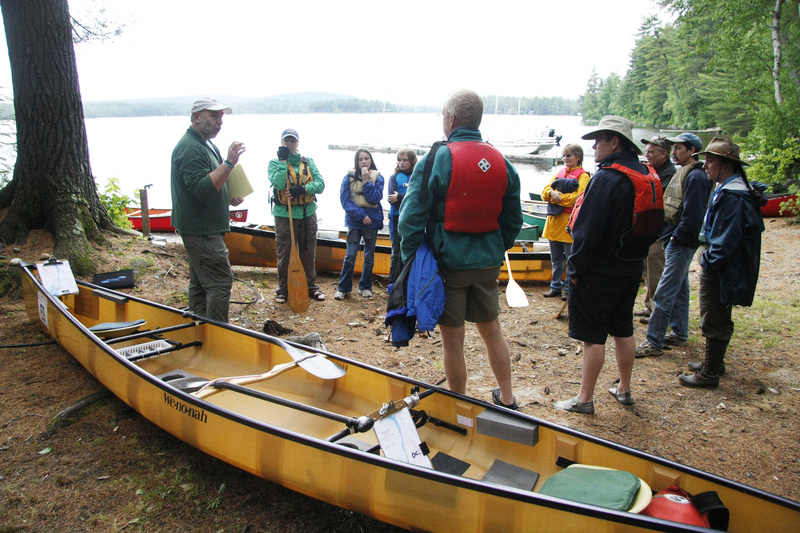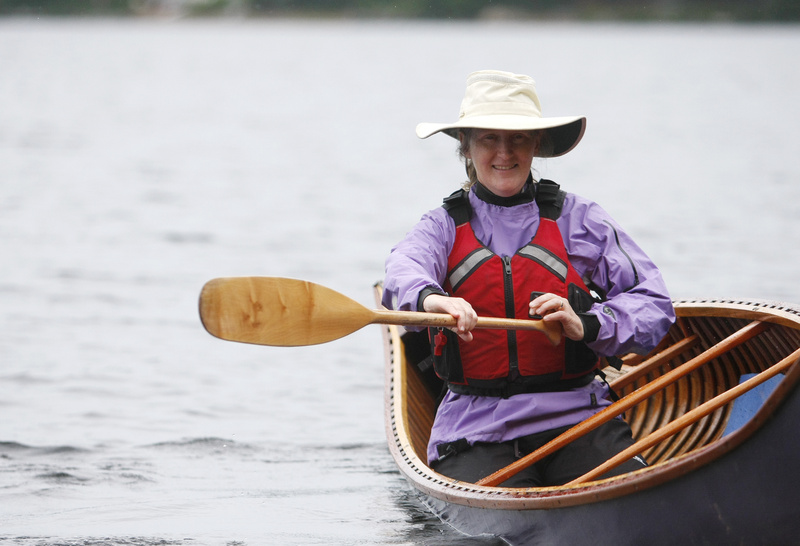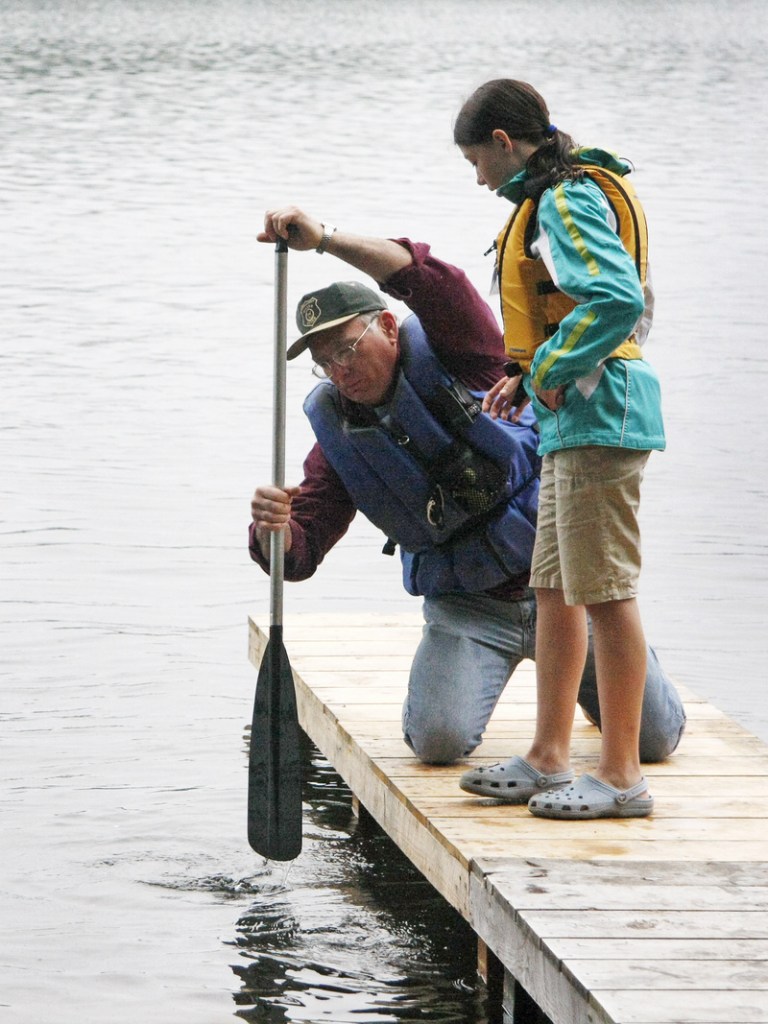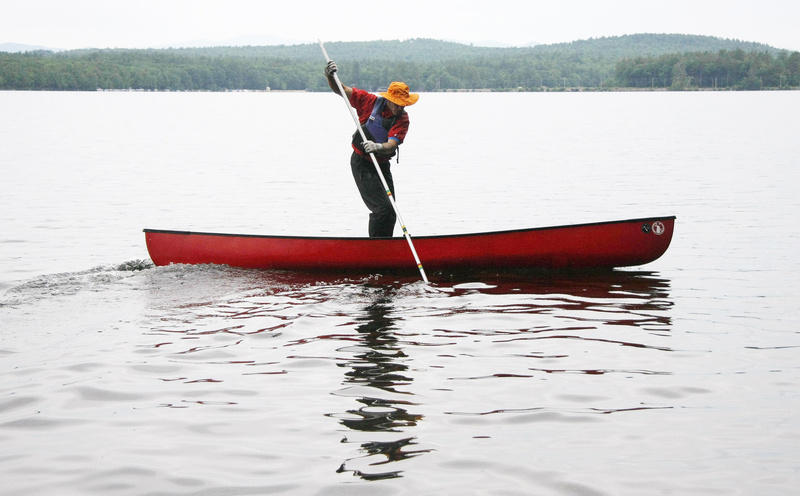BRIDGTON – The evergreens hugging Moose Pond give the shores of Camp Winona the feel of an outdoors classroom, even when there are no classes taking place. It’s a perfect setting for the likes of Gil Gilpatrick or Ray Reitze.
Once a year, paddling guides like these two men gather here at the Maine Canoe Symposium to teach, to pass on the best of canoe mastery and to reflect.
Despite modern times, and the myriad distractions the cordless culture presents, Maine’s most seasoned guides say many still want to flock to the backwoods to travel the waterways as the Native Americans did.
To be sure, the tradition has seen changes. At the same time, Registered Maine Guides with three decades of experience, like Gilpatrick and Reitze, say benefits of a Maine canoe trip remain true: Time on the water makes a paddler wiser and a guide more valuable.
“Once we leave the road and go on foot and on canoe, life changes. It just begins to settle. I think at some point you leave behind the busy life, and at some moment, get back into life,” said Reitze of Canaan.
This is why it’s so important to gather the paddling guides of Maine once a year, said David Butler, a symposium organizer.
Once a year the Maine Canoe Symposium brings together paddle guides from Maine and New England, Quebec and New Brunswick.
A guide for 15 years, Butler said people are still learning about the 25-year-old symposium started by L.L. Bean and run by Maine guides for a decade. This year 140 people came, including 20 youth paddlers.
And Butler said that for 25 years, the basics of the watercraft, paddles and purposes of canoe trips have been the same.
Canoe trips are still about getting into nature, eating a meal made at a campfire, and leaving all modern reminders of daily living, he said.
“The first trip I guided was with the Boy Scouts down the West Branch (of the Penobscot River) in 1973. It hasn’t changed a bit,” Butler said.
But expectations for trips have changed, he said. Participants want a more private trip today, and prefer spending less time away.
“Back then you could get people interested in a 10-day trip. Now we’re lucky to have a four-day trip,” Butler said. “People want just a weekend. But in terms of actually doing a trip it’s exactly the same. The trees are just a little bigger.”
And Gilpatrick said people prefer a private party rather than one made up of strangers, which doesn’t make sense to him.
Gilpatrick said the learning between strangers makes up a lot of the remarkable group energy.
“It doesn’t seem to work that way anymore, to have 10 strangers,” said Gilpatrick, 76, of Skowhegan. “The interesting thing is of all these people (over 30 years) I can only think of less than half a dozen who were real pains in the butt. But the rest were my kind of people.”
Reitze, 64, said part of what has changed over three decades of guiding canoe trips is his ability to take paddlers on a meaningful trip.
“I became a better teacher,” Reitze said. “I learned to go to you, to find you at your level. When I learned that, it became just a lot of fun. I’ve made so many friends in this world. It’s hard to imagine.”
The river is what helps forge lasting friendship in a week, or the mountains or a lake. Reitze said the place could be anywhere, so long as it is somewhere quiet in nature.
In such a place, people lose their problems and find peace, he said.
And he said someone who knows how to step back and show others how to slow down makes the best guide. Every year he guides, now part-time, he said he improves as a teacher.
“I would be lying if I told you otherwise,” he said with a soft chuckle. “That was one of my biggest lessons.”
Staff Writer Deirdre Fleming can be contacted at 791-6452 or at:
dfleming@pressherald.com
Send questions/comments to the editors.







Success. Please wait for the page to reload. If the page does not reload within 5 seconds, please refresh the page.
Enter your email and password to access comments.
Hi, to comment on stories you must . This profile is in addition to your subscription and website login.
Already have a commenting profile? .
Invalid username/password.
Please check your email to confirm and complete your registration.
Only subscribers are eligible to post comments. Please subscribe or login first for digital access. Here’s why.
Use the form below to reset your password. When you've submitted your account email, we will send an email with a reset code.